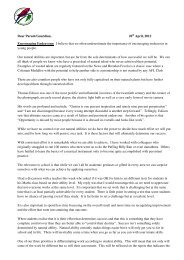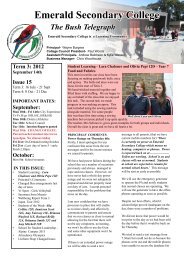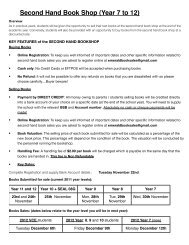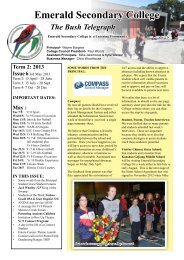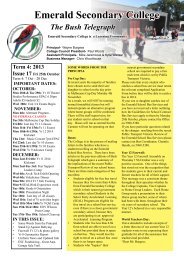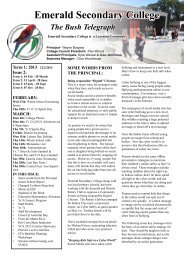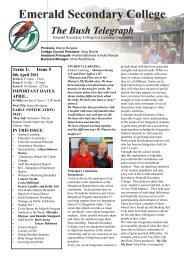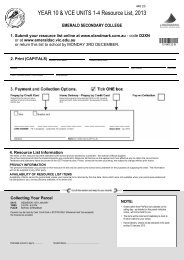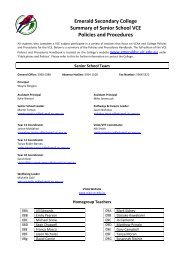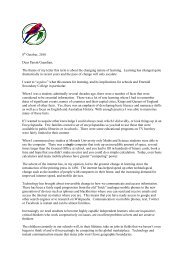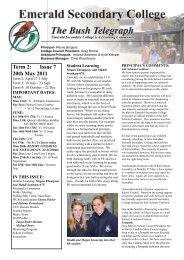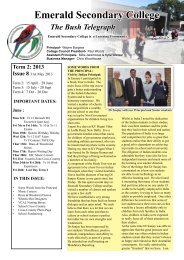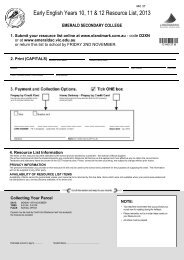Year 10 Curriculum Handbook 2014 - Emerald Secondary College
Year 10 Curriculum Handbook 2014 - Emerald Secondary College
Year 10 Curriculum Handbook 2014 - Emerald Secondary College
You also want an ePaper? Increase the reach of your titles
YUMPU automatically turns print PDFs into web optimized ePapers that Google loves.
<strong>Emerald</strong> <strong>Secondary</strong><br />
<strong>College</strong><br />
<strong>Year</strong> <strong>10</strong><br />
Course <strong>Handbook</strong><br />
<strong>2014</strong>
<strong>Emerald</strong> <strong>Secondary</strong> <strong>College</strong> <strong>Year</strong> <strong>10</strong> Course <strong>Handbook</strong> <strong>2014</strong><br />
2
<strong>Emerald</strong> <strong>Secondary</strong> <strong>College</strong> <strong>Year</strong> <strong>10</strong> Course <strong>Handbook</strong> <strong>2014</strong><br />
CONTENTS<br />
YEAR <strong>10</strong> CURRICULUM ................................................................................................ 4<br />
Foundation VCAL (Victorian Certificate of Applied Learning) ................................................ 4<br />
VCE Subjects .............................................................................................................................. 4<br />
Pathways to VCE ........................................................................................................................ 5<br />
CORE SUBJECTS .......................................................................................................... 6<br />
ELECTIVE SUBJECTS ................................................................................................... 6<br />
VCE SUBJECTS ............................................................................................................. 6<br />
YEAR <strong>10</strong> SUBJECT DESCRIPTIONS ............................................................................ 7<br />
ENGLISH ................................................................................................................................... 7<br />
MATHEMATICS ....................................................................................................................... 8<br />
THE ARTS.................................................................................................................................. 8<br />
HEALTH AND PHYSICAL EDUCATION .............................................................................. 9<br />
LANGUAGES OTHER THAN ENGLISH.............................................................................. <strong>10</strong><br />
SCIENCE .................................................................................................................................. <strong>10</strong><br />
HUMANITIES .......................................................................................................................... 11<br />
TECHNOLOGY ....................................................................................................................... 12<br />
VCE SUBJECT DESCRIPTIONS (UNIT 1 AND 2) ....................................................... 14<br />
ENGLISH ................................................................................................................................. 14<br />
MATHS..................................................................................................................................... 14<br />
THE ARTS................................................................................................................................ 14<br />
HEALTH AND PHYSICAL EDUCATION ............................................................................ 15<br />
SCIENCE .................................................................................................................................. 15<br />
HUMANITIES .......................................................................................................................... 15<br />
TECHNOLOGY ....................................................................................................................... 16<br />
3
<strong>Emerald</strong> <strong>Secondary</strong> <strong>College</strong> <strong>Year</strong> <strong>10</strong> Course <strong>Handbook</strong> <strong>2014</strong><br />
YEAR <strong>10</strong> CURRICULUM<br />
The <strong>Year</strong> <strong>10</strong> curriculum consists of a combination of core and elective subjects designed to cover the eight<br />
Key Learning Areas. Students at this level complete six units each semester. Each unit involves five periods<br />
per week. English, Math and Science are core subjects. A nit of English and Math must be taken each<br />
Semester, while at least one Science unit must be selected across the year. In addition, each semester<br />
students complete four elective subjects from the different Key Learning Areas.<br />
Students must select the following core units:<br />
English in Semester 1 and 2<br />
Maths in Semester 1 and 2<br />
Science – Semester 1 or 2<br />
Students select elective units from:<br />
Health & Physical Education<br />
Literature<br />
LOTE – Japanese<br />
Science<br />
Humanities<br />
The Arts<br />
Technology<br />
VCE subjects<br />
Student must select at least one subject from <strong>Year</strong> <strong>10</strong> Health & Physical Education, Humanities, The<br />
Arts, and Technology.<br />
If students select “Advance” or “LOTE – Japanese” it must be selected for both semesters<br />
Foundation VCAL (Victorian Certificate of Applied Learning)<br />
As an alternative to the traditional preparation for VCE and VCAL, <strong>Year</strong> <strong>10</strong> Foundation VCAL offers a<br />
more “hands-on” approach to learning. This course is an equivalent to a full time <strong>Year</strong> <strong>10</strong> program.<br />
<strong>Emerald</strong> <strong>Secondary</strong> <strong>College</strong> offers Foundation VCAL to complement our Intermediate and Senior VCAL<br />
Programs.<br />
Students in Foundation VCAL will undertake Numeracy and Literacy units, Personal Development units<br />
and Work Related Skills units here at the <strong>College</strong>. A fifth VCAL Unit, Industry Specific Skills, is only<br />
satisfied by successful enrolment and completion of Units of Competence of a VET course. Vet courses<br />
attract materials fees which must be paid to allow student enrolment. Foundation VCAL students do not<br />
undertake one week Work Experience at the end of Term 2. Students must source and undertake one<br />
day per week Work Experience for the entire second Semester.<br />
Experience with VCAL shows that it presents challenges and opportunities that differ from those in VCE<br />
or, in this case, the current <strong>Year</strong> <strong>10</strong> program. Students should be ready to take part in purposeful<br />
decision-making about their own education. Foundation VCAL is for students who are looking for<br />
opportunities in a more practical educational setting. Please note that this program will reduce the<br />
options available upon completion of <strong>Year</strong> 12 e.g. University Degrees and some Diploma level courses.<br />
VCE Subjects<br />
It is <strong>College</strong> policy to provide students with opportunities to extend themselves through a range of advanced<br />
and accelerated classes. The school encourages the most capable <strong>Year</strong> <strong>10</strong> students to tackle a VCE<br />
subject. This can have a number of advantages. Students gain valuable experience in how VCE operates.<br />
VCE units lead to students extending themselves by attempting more demanding work. By completing a<br />
VCE Unit 1 & 2 early, students may undertake VCE Units 3 & 4 while in <strong>Year</strong> 11 gaining additional points<br />
towards their ATAR score in <strong>Year</strong> 12. Students should choose units in which they have a special interest or<br />
ability, but these should not be in their main areas of study. Students will achieve their best results in these<br />
areas when they are in <strong>Year</strong> 12 with additional knowledge and maturity gained during <strong>Year</strong> 11.<br />
4
<strong>Emerald</strong> <strong>Secondary</strong> <strong>College</strong> <strong>Year</strong> <strong>10</strong> Course <strong>Handbook</strong> <strong>2014</strong><br />
Students interested in completing a VCE unit should have their course selection form signed by the relevant<br />
Key Learning Area Coordinator or the current teacher of the VCE subject. We would normally expect<br />
students not to take more than one VCE unit, partly because only one additional subject may be included in<br />
their ATAR, but also to ensure that they are not placing themselves under too much pressure. If students<br />
elect to complete a VCE subject while in <strong>Year</strong> <strong>10</strong> it is expected that they take that subject for the whole year.<br />
It is also assumed that students will complete that subject in the following year as a <strong>Year</strong> 12 subject.<br />
SEAL students will be given additional information regarding their subject choices.<br />
Pathways to VCE<br />
For a student to progress from <strong>Year</strong> <strong>10</strong> to VCE he/she must satisfy the unit prerequisites (successfully<br />
complete 9 units including both units of English).<br />
To ensure that students are well prepared for VCE, those students who do not successfully complete the unit<br />
prerequisites to progress to VCE will need to undertake further <strong>Year</strong> <strong>10</strong> subjects in combination with VCE<br />
units (a combined course) or to take the <strong>Year</strong> <strong>10</strong> course again.<br />
Students at the end of <strong>Year</strong> <strong>10</strong> may choose to:<br />
<br />
<br />
<br />
<br />
<br />
Complete their VCE with the view to gaining entry to University or TAFE courses, obtaining a job<br />
or apprenticeship/traineeship.<br />
Complete a Victorian Certificate of Applied Learning (VCAL) Certificate. This would include<br />
either a VET program or School Based Apprenticeship & Traineeship (SBAT) (one or two<br />
days at out-of-school employment, the other days at school completing the VCE).<br />
Complete a Vocational Education Training subject (VET) as part of their VCE/VCAL<br />
Enter a traineeship or apprenticeship<br />
Enter full-time paid employment.<br />
A student may not leave school without having arranged entry into one of the options on the list. For<br />
example a student under 17 years cannot leave school to look for work, but can leave school for full-time<br />
paid employment.<br />
The information contained in this handbook should not be considered as the definitive statements on the<br />
above pathways. There is a wide variety of additional information available from the <strong>College</strong> to help you<br />
understand the various pathways.<br />
General Office: 5968 5388 Fax Number: 5968 5322<br />
Senior School Leader<br />
Martin Toman<br />
toman.martin.p@edumail.vic.gov.au<br />
<strong>Year</strong> <strong>10</strong> Coordinator<br />
Sarah Deer<br />
christoffelsz.sarah-anne.s@edumail.vic.gov.au<br />
Pathways Leader<br />
Jason Nicholas<br />
nicholas.jason.s@edumail.vic.gov.au<br />
VCAL/VET Coordinator<br />
Nik Smith<br />
smith.nicholas.p@edumail.vic.gov.au<br />
Wellbeing Coordinator<br />
Michelle Galli<br />
galli.michelle.m@edumail.vic.gov.au<br />
VCAA Website<br />
www.vcaa.vic.edu.au<br />
5
<strong>Emerald</strong> <strong>Secondary</strong> <strong>College</strong> <strong>Year</strong> <strong>10</strong> Course <strong>Handbook</strong> <strong>2014</strong><br />
ENGLISH<br />
<strong>Year</strong> <strong>10</strong> English<br />
Enrichment English<br />
Essential English<br />
MATHEMATICS (one of)<br />
<strong>Year</strong> <strong>10</strong> Maths Enrichment (Advanced)<br />
<strong>Year</strong> <strong>10</strong> Maths (Core)<br />
<strong>Year</strong> <strong>10</strong> Maths for Everyday Living<br />
CORE SUBJECTS<br />
ELECTIVE SUBJECTS<br />
SCIENCE<br />
(At least one of the 4 Science subjects must be<br />
studied)<br />
Chemistry<br />
Genetics & Biotechnology<br />
Psychology<br />
Space Science<br />
THE ARTS<br />
2D Art<br />
Ceramics<br />
Digital Photography<br />
Visual Communication & Design<br />
Media Studies<br />
Music<br />
Drama<br />
ENGLISH<br />
Literature<br />
HEALTH/PE<br />
Health & Human Movement<br />
Introduction to Outdoor Education<br />
Advanced Physical Education<br />
Advance Program – Units 1 & 2<br />
Fitness & Coaching<br />
ENGLISH<br />
Literature<br />
MATHS<br />
General Maths – Further<br />
THE ARTS<br />
Studio Arts - 2D or 3D<br />
Visual Communication & Design<br />
Media<br />
Music<br />
Theatre Studies<br />
HEALTH & PHYSICAL EDUCATION<br />
Health & Human Development<br />
Outdoor and Environmental Studies<br />
Physical Education<br />
LOTE<br />
<strong>Year</strong> <strong>10</strong> Japanese<br />
VCE SUBJECTS<br />
(depending on availability)<br />
HUMANITIES<br />
Accounting (VCE Unit 2)<br />
Business Studies<br />
Geography – An Active Planet<br />
History – World Conflict<br />
Legal Studies<br />
TECHNOLOGY<br />
Garment Construction<br />
Clothing<br />
Electrical Technology<br />
Food Technology<br />
Home Economics<br />
Advanced Patisserie<br />
Information Technology<br />
Metal Materials<br />
Wood Materials<br />
SCIENCE<br />
Biology<br />
Psychology<br />
HUMANITIES<br />
Accounting<br />
Business Management<br />
Economics<br />
Geography<br />
History – 20 th Century History<br />
Legal Studies<br />
TECHNOLOGY<br />
Design & Technology - Metals/Wood/Textiles<br />
Food & Technology<br />
Information Technology<br />
Systems & Technology (Electronics)<br />
6
<strong>Emerald</strong> <strong>Secondary</strong> <strong>College</strong> <strong>Year</strong> <strong>10</strong> Course <strong>Handbook</strong> <strong>2014</strong><br />
ENGLISH<br />
YEAR <strong>10</strong> ENGLISH – ENG<br />
YEAR <strong>10</strong> SUBJECT DESCRIPTIONS<br />
English at <strong>Year</strong> <strong>10</strong> is modeled off the VCE curriculum and each semester is divided into three areas of study: reading and<br />
responding, creating and presenting and using language to persuade. Students will be assessed through a range of tasks<br />
including: essays, imaginative and expository writing, language analysis and oral presentations.<br />
<strong>Year</strong> <strong>10</strong> English aims to build students ability to:<br />
Skills in listening, speaking, reading, viewing and writing<br />
Capacity to create texts for a range of purposes, audiences and contexts<br />
Understanding and appreciation of different uses of language<br />
English is designed to develop students’ understanding of text types and language modes. The course aims to foster an<br />
appreciation of the value of reading and writing skills for lifelong learning.<br />
The <strong>Year</strong> <strong>10</strong> English curriculum focuses strongly on preparing students to be able to undertake VCE English Units 1 – 4 in<br />
<strong>Year</strong>s 11 and 12 at the highest possible standards.<br />
YEAR <strong>10</strong> LITERATURE – ENLI<br />
Literature at <strong>Year</strong> <strong>10</strong> is an exciting and academic course that challenges students to think deeply about how we<br />
understand and make meaning from texts. Introducing students to the concept that texts are ‘constructions’. Students will<br />
analyse a range of novels, films and poems in order to debate ideas and develop their critical thinking skills. This will<br />
broaden their understanding of how language influences meaning.<br />
<strong>Year</strong> <strong>10</strong> Literature aims to build students ability to:<br />
Understand how literature is significant in everyday life<br />
Practice passage analysis skills by examining literary works to identify the key ideas and values on which they are<br />
based<br />
Begin to compare works of literature from different language, ethnic and cultural backgrounds<br />
Understand some of the historical origins, authorship, readership and reception of texts<br />
Explore the relationships between historical, cultural and literary traditions.<br />
<strong>Year</strong> <strong>10</strong> Literature is a recommended subject if students are considering undertaking Units 1 and 2 Literature (VCE).<br />
YEAR <strong>10</strong> ENRICHMENT ENGLISH - EEN<br />
Enrichment English at <strong>Year</strong> <strong>10</strong> has been designed to extend and enrich the student’s knowledge using a modified VCE<br />
English curriculum. In Enrichment English students will be exposed to a range of different texts including novels, plays,<br />
speeches, philosophical treatises, films and media articles. They will be required to write analytical essays, create<br />
imaginative writing in different genres, respond to philosophical ideas and demonstrate a considered, informed opinion<br />
about the world around them.<br />
The course aims to develop students’ critical understanding and control of the English language through the development<br />
of specific skills required for clear communication. This includes providing opportunities for creative self-expression<br />
through speaking and listening in a variety of contexts:<br />
Creative and formal writing<br />
Analysis of issues<br />
Analytical and persuasive essays<br />
The reading and writing of poetry<br />
In-depth analysis of different text types<br />
The course aims to extend, challenge, and enrich student learning through a range of extension and enrichment tasks that<br />
are designed to enhance student outcomes in Unites 1 – 4 VCE English.<br />
This subject is a recommended pathway for SEAL students and for excellent English students (in general).<br />
7
<strong>Emerald</strong> <strong>Secondary</strong> <strong>College</strong> <strong>Year</strong> <strong>10</strong> Course <strong>Handbook</strong> <strong>2014</strong><br />
YEAR <strong>10</strong> ESSENTIAL ENGLISH -EES<br />
Essential English at <strong>Year</strong> <strong>10</strong> is designed to develop students’ literacy skills and for those who wish to undertake a practical<br />
English course. Based on a modified VCE curriculum and across the year, students will complete tasks from three areas<br />
of study: reading and responding, creating and presenting and using language to persuade. This subject is deliberately<br />
designed to build practical reading and writing skills through a range of assessment tasks.<br />
<strong>Year</strong> <strong>10</strong> Essential English aims to build students ability to:<br />
Understand, evaluate and communicate effectively in and for a range of contexts<br />
Develop and refine their reading and writing skills through extending practice of writing tasks including essays,<br />
expository writing and persuasive language<br />
Self-confidence to effectively use language in academic and workplace situations<br />
<strong>Year</strong> <strong>10</strong> Essential English is designed to empower students to feel confident to undertake either a practical program like<br />
VCAL or a more traditional Unite 1 – 4 VCE English pathway.<br />
MATHEMATICS<br />
YEAR <strong>10</strong> MATHEMATICS ENRICHMENT – MEN<br />
Maths Enrichment is designed for students seeking to study the more demanding <strong>Year</strong> 11 and 12 Mathematics. Students<br />
will complete the majority of the <strong>Year</strong> <strong>10</strong> curriculum and will have the opportunity to study further trigonometry, advanced<br />
graphing techniques and introduction to logarithms. Students will be expected to purchase a CAS calculator. Enrichment<br />
will give students a strong foundation for Maths Methods in <strong>Year</strong> 11 and 12. Entry is by teacher recommendation.<br />
Successful completion will enable students to apply for entry into any VCE Maths Pathway.<br />
.<br />
YEAR <strong>10</strong> MATHEMATICS – MAT<br />
Following from <strong>Year</strong> 9, this study equips students with the important concepts, skills and understandings that they need to<br />
develop to become successful in mathematics. The topics within each of the units of work are designed to consolidate<br />
and extend the students mathematical skills and knowledge. Successful completion will enable students to apply for entry<br />
into General Maths (Further) or Foundation Maths in <strong>Year</strong> 11 and the possibility of Further Maths in <strong>Year</strong> 12.<br />
YEAR <strong>10</strong> MATHEMATICS FOR EVERYDAY LIVING – MEL<br />
The purpose of this option is to provide an alternative to mainstream Mathematics at <strong>Year</strong> <strong>10</strong>. It is designed for students<br />
who have had at times had difficulties with the concepts in <strong>Year</strong> 9 Mathematics. Selection for this subject is by teacher<br />
recommendation, course counseling, parent consent and permission of the Mathematics KLA. By taking this option,<br />
students must be aware that they will not be able to complete a VCE Mathematics subject in <strong>Year</strong>12. This option covers<br />
basic skills that are applied to personal finances, related to work situation and aspects that arise in everyday life.<br />
THE ARTS<br />
YEAR <strong>10</strong> 2D ART – ART<br />
This unit prepares students for VCE Studio Arts (2D). Students explore and experiment with the techniques and styles<br />
of artists, using a variety of mediums. They are required to produce a Visual Diary, which includes planning,<br />
experimentations, and refinement of ideas. Students produce a folio of art works that reflect their research. Through<br />
written and practical work, students learn to analyse artists and artworks using appropriate terminology. Topics may<br />
include Portraitures, Landscapes, Observational Drawing and Organic forms. Art forms to be explored may include<br />
drawing, painting, printmaking and collage.<br />
YEAR <strong>10</strong> CERAMICS - ARCR<br />
In <strong>Year</strong> <strong>10</strong> Ceramics, students are required to produce a folio of ceramic sculptures and constructions with emphasis<br />
on the development of a personal style. Students complete assignments on ceramic techniques and processes.<br />
Students study cultural and historical ceramic styles, through practical and written assignments and through exploring<br />
past and present artists. Students learn to identify, analyse and use appropriate art terminology to respond to these<br />
ceramic works.<br />
8
<strong>Emerald</strong> <strong>Secondary</strong> <strong>College</strong> <strong>Year</strong> <strong>10</strong> Course <strong>Handbook</strong> <strong>2014</strong><br />
YEAR <strong>10</strong> DIGITAL PHOTOGRAPHY - ARPH<br />
This unit prepares students for VCE Studio Arts (2D). Students learn to use creative photographic processes using a<br />
digital camera. They are required to produce a display book that demonstrates their understanding of the creative<br />
editing and manipulating techniques used to generate images. They are required to produce a folio of photographic<br />
prints, which demonstrates their understanding of the techniques studied. Students will learn to research, identify,<br />
analyse and use appropriate terminology to respond to different photographers styles of artwork through practical and<br />
written assignments. Topics may include Fantasy portraits, Surrealistic animals, and Visual Photographic essays.<br />
YEAR <strong>10</strong> VISUAL COMMUNICATION AND DESIGN - ARVC<br />
This unit prepares students for VCE Visual Communication and Design. Students are required research and produce a<br />
folio that demonstrates their understanding of the design process. Through investigation of the history of design,<br />
students will research and refine ideas to develop a personal visual communication style. Students are required to<br />
produce a folio of visual communication artworks. Students are required to evaluate their own work, research and<br />
analyse visual communications, using appropriate terminology. Topics may include architectural rendering, poster<br />
design, business packages and product promotion.<br />
YEAR <strong>10</strong> MEDIA STUDIES - ARME<br />
In Media Studies, students study representation, product construction and narrative. Students examine a film study<br />
and are introduced to film analysis techniques, narrative concepts and production techniques. Students complete<br />
practical technical exercises relating to Stopmotion animation, and film where they learn skills in planning, production<br />
and reflection. A major practical project is undertaken during the semester where students learn the art of creating a<br />
horror film and a movie trailer. Through this project students learn how to operate cameras, lighting, editing equipment<br />
and computer software.<br />
YEAR <strong>10</strong> MUSIC - ARMU<br />
This unit prepares students for VCE VET Music Performance, and is highly recommended for students who already<br />
play an instrument. <strong>Year</strong> <strong>10</strong> Music at ESC is divided into 3 components to equip students to become well-rounded<br />
musicians.<br />
<br />
<br />
<br />
Practical Component – students are given opportunities to extend their skills on a number of instruments as a<br />
soloist and as part of a group, and also gain experience in performance.<br />
Music Theory – building on skills attained in <strong>Year</strong> 9 music, by the end of this unit students should be able to<br />
read and write basic music notation for the purpose of learning and performing music.<br />
Film Music Study – Students study how music is used in film and learn about the impact of music and how it<br />
can be created for various purposes. Students learn to recognise music composition devices and explore such<br />
compositional devices for their own music making.<br />
YEAR <strong>10</strong> DRAMA - ARDR<br />
This unit prepares students for VCE Drama and Theatre Studies. Students will participate in workshop activities to<br />
further develop performance, theatre and characterisation skills. They will work in small groups to explore a range of<br />
theatre skills and be exposed to a range of theatre styles. A major feature of the course will be an ensemble<br />
performance to an outside audience. Students will design, construct and organise all the necessary elements of<br />
stagecraft to mount the performance. They will be expected to keep a record/folio of activities undertake which will<br />
include evaluations of completed projects. Students will view at least one live theatre performance and complete a<br />
written review on the performance viewed.<br />
HEALTH AND PHYSICAL EDUCATION<br />
HEALTH AND HUMAN MOVEMENT - PDHE<br />
This unit is designed to introduce students to senior Health and Human Development and is recommended for those<br />
intending to complete this VCE subject. The practical component looks at health and fitness via participation in a<br />
variety of physical activities. The theory component looks at adolescent health issues such as women in sport, body<br />
image and physical activity, eating disorders, diet and nutrition, road safety, organ donation and social issues such as<br />
abortion.<br />
NB. A materials charge, as well as various entry fees, are applicable to all students in this unit.<br />
9
<strong>Emerald</strong> <strong>Secondary</strong> <strong>College</strong> <strong>Year</strong> <strong>10</strong> Course <strong>Handbook</strong> <strong>2014</strong><br />
INTRODUCTION TO OUTDOOR EDUCATION - PDOE<br />
This unit introduces students to bushwalking and lightweight camping, canoeing, orienteering / rogaining, rock climbing<br />
and abseiling, caving, initiative activities, pioneering, map and compass work, environmental and safety education.<br />
Students are also expected to attend a camp during this unit.<br />
NB. A unit cost of approximately $80 for bus and equipment use applies for this unit.<br />
ADVANCED PHYSICAL EDUCATION - PDPE<br />
This unit is seen as an introduction to VCE Physical Education 1, and is strongly recommended for those intending to<br />
follow this path. The practical component includes racquet sports such as badminton, tennis, squash/racquet ball and<br />
table tennis, while recreational sports include bocce, croquet, quoits and ten pin bowling. The theory component<br />
examines the skeletal system, the articular system, the muscular system, the heart and circulation, the respiratory<br />
system and an introduction to the body’s energy systems.<br />
NB. A materials charge, as well as various entry fees, are applicable to all students in this unit.<br />
FITNESS AND COACHING - PDFC<br />
This unit is seen as an introduction to VCE Physical Education Unit 2, and is strongly recommended for those<br />
intending to follow this path. The practical component includes: golf, training programs, and advanced team sports;<br />
focusing on skills, strategy, umpiring, and coaching. The theory component looks at: fitness components and their<br />
associated testing procedures, skill acquisition, training principles, training methods and coaching styles.<br />
NB, A materials charge, as well as various entry fees, is applicable to all students in this unit.<br />
ADVANCE PROGRAM - ADV<br />
The Advance Program is designed to run as a two-year course. It is run in conjunction with The Royal Lifesaving Society<br />
of Victoria and those involved will have the opportunity to complete the Duke of Edinburgh Award. The program<br />
incorporates components of leadership, teamwork, initiative, personal and group responsibility as well as training in first<br />
aid, resuscitation, swimming and lifesaving skills.<br />
NB. A cost of approximately $60 applies for this unit, plus an additional payment for the Duke of Edinburgh Award.<br />
LANGUAGES OTHER THAN ENGLISH<br />
YEAR <strong>10</strong> JAPANESE – LOT (Semester One)<br />
Topics studied in this unit include expressions related to family, places and directions. Formal and informal speech is<br />
compared and new grammatical structures are studied in preparation for the VCE level. Students will also develop<br />
their speaking skills individually and in groups and produce written work in a variety of discourse forms.<br />
YEAR <strong>10</strong> JAPANESE – LOT (Semester Two)<br />
In this unit students are further prepared for the study of Japanese at VCE level. Students will increase their<br />
knowledge of kanji and should be able to read and write approximately 80 characters at the conclusion of <strong>Year</strong> <strong>10</strong>.<br />
More sophisticated grammatical structures will be studied and students should have a clear understanding of formal<br />
and informal speech and be experienced in writing different discourse forms.<br />
SCIENCE<br />
All students must complete one unit of Science, however two are highly recommended for students considering taking<br />
Chemistry, Physics, Biology or Psychology at VCE.<br />
<br />
<br />
<br />
<br />
If you are considering Biology in VCE you should select Chemistry and Genes Biotechnology or VCE<br />
psychology<br />
If you are considering Chemistry in VCE you should select Chemistry and Genes Biotechnology or Space<br />
Science<br />
If you are considering Psychology in VCE you should select Psychology and Genes Biotechnology<br />
If you are considering Physics in VCE you should select Space Science and Chemistry<br />
<strong>10</strong>
<strong>Emerald</strong> <strong>Secondary</strong> <strong>College</strong> <strong>Year</strong> <strong>10</strong> Course <strong>Handbook</strong> <strong>2014</strong><br />
CHEMISTRY - SCCH<br />
Chemistry investigates the very nature of matter – everything that we can touch, sense, feel and interact with. It<br />
explores how three tiny subatomic particles (protons, neutrons and electrons) make up everything around us. We<br />
explore how these particles come together to make up all the different compounds and elements around us and how,<br />
in turn, these interact with one another, to create life, cause reactions, explosions, colour changes and the release and<br />
storage of energy. We look at how chemistry can help us create new and exciting materials to allow us to make better<br />
electronic and smart devices, produce safer products and even walk up walls and hang from ceilings!<br />
SPACE SCIENCE - SCSS<br />
Space science explores how the universe was formed and the creation of the elements by nuclear fusion inside stars.<br />
It also explores the 'life cycle' of stars including the formation of black holes and supernovae, and the consequences of<br />
travelling at very high speed (including the affect it has on time). It investigates how we search for planets outside of<br />
our own solar system that may support life, and how we use light, and other forms of electromagnetic radiation, to<br />
probe everything from the most distant stars to the tiniest of subatomic particles here on Earth. We explore how light<br />
is teamed up with electronics in modern high tech communication systems (photonics). We also look at applications of<br />
light in a more familiar context such as how to make a telescope or a pinhole camera. We will also explore forces to<br />
understand why objects move in the way that they do. In particular, the forces associated with flight, satellites and<br />
planets in orbit, rockets and high performance sport.<br />
GENES AND BIOTECHNOLOGY - SCGB<br />
Biotechnology is the use of living organisms and the substances produced by them. Because scientists can determine<br />
the genetic code of any organism and can manipulate genes, many new techniques have been developed. This unit<br />
will explore the role of DNA and genes in determining patterns of inheritance and what impact mutations have on<br />
inheritance. Plants and animals have been selectively bred and chemicals have been extracted from animals and<br />
plants to make medicines, glues, health products and fibres. These techniques will be investigated and you will<br />
conduct your own investigation on growing bacteria and investigating the effect of antibiotics on their growth. This unit<br />
will combine a study of Biology and Chemistry and includes an excursion to GTAC the Gene Technology Access<br />
Centre.<br />
PSYCHOLOGY - SCPY<br />
Why is it that people behave the way they do? How can an event in one person’s life lead to one reaction in one<br />
person and a completely different reaction in another? Are our brains all wired the same? Is nature more important<br />
than nurture in determining who we are? Does body language convey more than what we have to say? How do we<br />
define intelligence and measure IQ? Why are people’s personalities so different? What does your personality type tell<br />
you about yourself and future careers?<br />
If you are interested in whys and wherefores of human and animal behaviour, then this is for you. If you like<br />
discussion, debating and carrying out research then try this course. You might find out something about yourself you<br />
didn’t know. Take the challenge.<br />
HUMANITIES<br />
ACCOUNTING - HUAC<br />
This is a VCE unit available for <strong>Year</strong> <strong>10</strong> students. The course is Accounting (VCE – Unit 2).<br />
Accounting is a vital aspect of running any successful business. In this unit students will develop and use a single<br />
entry recording system for retail businesses. They will develop their knowledge and understanding of financial<br />
terminology. They will learn to analyse and evaluate the performance of business to improve decision-making. They<br />
will use manual and computerised accounting systems including a commercial accounting software package. By<br />
completing this unit, students will be prepared for selecting VCE Unit 3 & 4 Accounting the following year.<br />
BUSINESS STUDIES - HUBS<br />
This semester unit is designed to encourage students to investigate the issues in the business environment that<br />
impact on the success of enterprises. Students will examine the skills and characteristics of successful entrepreneurs<br />
and study the marketing strategies used to improve the success rate of small business, with the aim of running their<br />
own enterprise for a day. Students will also explore the vital role that businesses and consumers play in the operation<br />
11
<strong>Emerald</strong> <strong>Secondary</strong> <strong>College</strong> <strong>Year</strong> <strong>10</strong> Course <strong>Handbook</strong> <strong>2014</strong><br />
of the Australian economy, and investigate the social, economic and personal effects of issues such as unemployment<br />
and inflation. This unit will provide a solid foundation for VCE Business Management and VCE Economics.<br />
GEOGRAPHY – STUDIES OF THE GLOBAL ENVIRONMENT - HUGE<br />
This unit investigates the global environment and the relationships between the natural and human processes in it.<br />
1. The Weather and Climate<br />
An investigation of the processes that control our weather and Man’s impact on them<br />
2. The Restless Earth<br />
A study of our active Earth through an investigation of volcanoes and earthquakes<br />
3. Resource Management<br />
A study of issues & problems related to our use & management of the natural environment<br />
HISTORY - HUHI<br />
<strong>Year</strong> <strong>10</strong> History provides a study of the history of the modern world and Australia from 1918 to the present, with an<br />
emphasis on Australia in its global context. Historical knowledge and understanding is covered through an overview of<br />
areas:<br />
<br />
<br />
<br />
<br />
<br />
the inter-war years between World War I and World War II, including the Treaty of Versailles, the Roaring<br />
Twenties and the Great Depression<br />
continuing efforts post-World War II to achieve lasting peace and security in the world, including Australia’s<br />
involvement in UN peacekeeping<br />
the major movements for rights and freedom in the world and the achievement of independence by former<br />
colonies<br />
the nature of the Cold War and Australia’s involvement in Cold War and post-Cold War conflicts (Korea,<br />
Vietnam, The Gulf Wars, Afghanistan), including the rising influence of Asian nations since the end of the Cold<br />
War<br />
developments in technology, public health, longevity and standard of living during the twentieth century, and<br />
concern for the environment and sustainability.<br />
LEGAL STUDIES - HULS<br />
This unit explores aspects of Australia’s legal system.<br />
1. You and the law - what is law? Is there a need for laws? How laws are made by parliament and the courts, Criminal<br />
and Civil law, Victoria’s court hierarchy, excursion to the Magistrates Court.<br />
2. Types of punishment - including imprisonment, fines, community-based orders.<br />
3. The police - role of the police - what information are you obliged to give? Arrest, warrants.<br />
4. Your legal rights - people less than 18 years of age, juvenile crime, case studies on particular areas, and the Children’s<br />
Court.<br />
5. Individual research project: students select their own topic related to the course content.<br />
TECHNOLOGY<br />
GARMENT CONSTRUCTION - TSTX (Semester One)<br />
Students undertaking this unit are required to: design, produce and evaluate textiles articles, including one garment to be<br />
worn on a specific occasion. Prior knowledge and experience is preferred as students incorporate at least fifteen<br />
advanced construction techniques during the production stage (including using the sewing machine and over-locker), and<br />
use commercial patterns as a basis for their designs. Theory work includes preparing a design plan (investigating a range<br />
of options, costing and comparisons, suitability and care) and evaluation for each product.<br />
CLOTHING – TSCL (Semester Two)<br />
Garment construction is not a prerequisite for this unit. Students design and make an outfit to wear to the races at Caulfield<br />
in October, and complete a detailed report after each excursion.<br />
12
<strong>Emerald</strong> <strong>Secondary</strong> <strong>College</strong> <strong>Year</strong> <strong>10</strong> Course <strong>Handbook</strong> <strong>2014</strong><br />
ELECTRONIC TECHNOLOGY - TSEL<br />
This unit is an introduction to electronics. It will include a study of the basic electronic components (resistors, capacitors,<br />
etc). It will also include component recognition techniques including colour code of resistors, transistor and diode polarity.<br />
Testing procedures will be reinforced by the introduction to the multimeter and oscilloscope. The practical component will<br />
further develop the skills learnt in <strong>Year</strong> 9 and advanced faultfinding will strengthen the understanding of testing equipment.<br />
FOOD TECHNOLOGY - TSFD<br />
This unit is an introduction to VCE Food Technology. Students are involved in food preparation and its associated skills,<br />
methods of cooking, processes, product development and innovations, food hygiene and food handling. Students will use<br />
a range of practical skills to develop an understanding of the processes and foods used in cookery.<br />
NB. This unit has an $<strong>10</strong>0 fee that covers the cost of food and a student workbook.<br />
HOME ECONOMICS - TSHE<br />
This unit covers an introduction to growth and development and nutritional needs throughout the lifecycle. Students will<br />
study food, nutrition and health, and the use of a range of practical skills to produce meals and baked goods suitable for<br />
various stages of the life span.<br />
NB. This unit has an $<strong>10</strong>0 fee that covers the cost of food and a student workbook.<br />
ADVANCED PATISSERIE - TSPT<br />
In this unit we will build on the skills learnt in Yr 9 Patisserie (not a prerequisite) and undertake more challenging practical<br />
work and increase your understanding of key ingredients and how they function in recipes. Food design, decoration and<br />
presentation as always will be featured and involve extension work with piping, decorating with chocolate and butter<br />
creams. Students will have the opportunity to work on a major production task of their choice. Both sweet and savoury<br />
food items will be prepared. Skills attained will prepare you for senior Food and Technology or as a lead into TAFE<br />
studies in hospitality.<br />
NB. This unit has an $<strong>10</strong>0 fee that covers the cost of food and a student workbook.<br />
INFORMATION TECHNOLOGY - TSIT<br />
This unit is designed to reinforce, consolidate and build on the various information technology skills and design<br />
techniques previously learned in <strong>Year</strong> 9 and prepare students for further study in the Information Technology area.<br />
Students will be introduced to advanced information technology techniques, skills and problem solving methodologies as<br />
well as developing programming skills. Specific attention will be given to the following: Web page design, development<br />
and publishing; programming techniques and application; graphical manipulation.<br />
METALS MATERIALS - TSMT<br />
This unit is designed to reinforce, consolidate and build on the various practical skills and techniques previously learned<br />
in <strong>Year</strong> 9, and prepares students for further study in the metal technology area. Specific attention will be given to the<br />
following: materials; correct use of tools, and machinery; measurements, instruments and functional tolerances;<br />
manufacturing process including joining and fastening; design and problem solving techniques; safe work practices. All<br />
aspects of project production are evaluated in a journal and final report.<br />
WOOD MATERIALS - TSWD<br />
This unit is designed to reinforce, consolidate and build on the various skills and techniques previously learnt in <strong>Year</strong> 9<br />
and prepares students for further study in the Technology area. Specific attention will be given to the following: materials;<br />
established technology including machinery and correct use of tools; measurements; manufacturing process including<br />
joining and fastening; design and problem solving techniques; safe work practices; written evaluations of final products.<br />
Students will undertake an investigation in using recycled wood in comparison to new timber.<br />
13
<strong>Emerald</strong> <strong>Secondary</strong> <strong>College</strong> <strong>Year</strong> <strong>10</strong> Course <strong>Handbook</strong> <strong>2014</strong><br />
ENGLISH<br />
LITERATURE - LI<br />
VCE SUBJECT DESCRIPTIONS (UNIT 1 AND 2)<br />
The study of literature focuses on the enjoyment and appreciation of reading that arises from discussion, debate and<br />
the challenge of exploring the meanings of literary texts. Students reflect on their interpretations and those of others.<br />
This study is based on the premise that meaning is derived from the relationship between the text, the context in which<br />
it was produced and the experience of life and literature the reader brings to the texts. Accordingly, the study<br />
encompasses texts that vary in form and range from past to contemporary social and cultural contexts. Students learn<br />
to understand that texts are constructions, to consider the complexity of language and to recognize the influence of<br />
contexts and form. The study of literature encourages independent and critical thinking in students’ analytical and<br />
creative responses to texts, which will assist students in the workforce and in future academic study.<br />
MATHS<br />
GENERAL MATHS – FURTHER - MA<br />
General Mathematics (Further) is the study of Statistics and Probability, Arithmetic, Functions and Graphs, Algebra,<br />
Geometry and Trigonometry. General Maths (Further) is a prerequisite for Further Maths 3 + 4.<br />
Students require a Computer Algebra System (CAS) calculator and in this school we use the TI-Nspire.<br />
Pre-requisite: <strong>Year</strong> <strong>10</strong> Maths (prior or concurrently) or <strong>Year</strong> 9 SEAL Maths (with approval).<br />
THE ARTS<br />
STUDIO ARTS - SA<br />
Studio Arts is the practicing and making of effective artworks through a developmental process. Students generate,<br />
explore and communicate ideas through specific studio forms. They experiment, develop and use specialized skills in<br />
a range of media and techniques. Students specialize in a particular form of studio production. The theory component<br />
is an investigation of the development of selected studio forms and artists’ working methods and includes a study of<br />
professional practices and art industry issues. Students need to discuss this subject with the relevant teacher.<br />
NOTE: Studio Arts will focus on 2D (Drawing, Painting, Photography, Printmaking and Mixed Media).<br />
VISUAL COMMUNICATION AND DESIGN - VC<br />
This study encourages students to experiment and interpret a range of visual communications, which includes the<br />
understanding and application of drawing conventions, design element principles and function of design in<br />
communication. The study also provides the opportunity to develop an informed approach to visual communications<br />
encountered in everyday life. Students need to discuss this subject with the relevant teacher.<br />
MEDIA - ME<br />
Students develop an understanding of the relationship between the media, technology and the representatives present<br />
in media forms. Students also develop practical skills by producing short narrative videos. Students develop an<br />
awareness of the specialist production stages within collaborative organization of the media. Students develop<br />
practical skills and analyse issues concerning the media production process. Students have the opportunity to create<br />
music videos, short films, Stopmotion animation and story books.<br />
MUSIC PERFORMANCE - ME<br />
Music permeates everyone’s life. Music-making and musical appreciation are skills that enable people to be employed<br />
in the entertainment industry or to have a rewarding pastime. In <strong>Year</strong> 11 Music, students focus on building their<br />
performance and musicianship skills.<br />
THEATRE STUDIES - TS<br />
Theatre Studies involves students in the interpretation and production of plays. Students will acquire an<br />
understanding of theatre through the ages – its traditions and history. Knowledge acquired in this area will be applied<br />
14
<strong>Emerald</strong> <strong>Secondary</strong> <strong>College</strong> <strong>Year</strong> <strong>10</strong> Course <strong>Handbook</strong> <strong>2014</strong><br />
to produce a major performance and monologues to an audience. To assist their understanding of Theatre, students<br />
will experience plays in performance as an audience member and be instructed in analytical and reviewing skills.<br />
HEALTH AND PHYSICAL EDUCATION<br />
HEALTH AND HUMAN DEVELOPMENT - HH<br />
The central focus of the Health and Human Development study is to examine the factors that promote well-being in<br />
individuals, families and communities. This study aims to develop and understanding of the relationship between<br />
health and human development.<br />
OUTDOOR AND ENVIRONMENTAL STUDIES - OE<br />
This unit looks at the way in which humans understand and relate to the nature and context of outdoor environments.<br />
The unit focuses on human-nature relationships, different understandings of nature and different types of outdoor<br />
environments. It also develops an understanding of nature through practical experiences and investigation of particular<br />
outdoor environments. The unit also focuses on human-related impacts on natural environments at local, regional and<br />
state levels. Outdoor recreation provides a major focus for studying this impact, as well as the ecological, social and<br />
economic implications on the environment. The unit also provides an opportunity to evaluate state and local<br />
conservation policies and environmental legislation.<br />
PHYSICAL EDUCATION - PE<br />
This unit introduces the student to the relationships between the various body systems and physical activity. The unit<br />
also looks at a range of factors that influence learning and improve physical skills development, as well as examining<br />
the role that psychology and coaching styles has on producing enhanced performances. It also addresses the issue of<br />
physical activity on our lives as well as within the wider community, and the consequences of inactivity.<br />
SCIENCE<br />
Highly able students can select VCE Biology or VCE Psychology in <strong>Year</strong> <strong>10</strong>, but must ALSO complete a <strong>Year</strong> <strong>10</strong><br />
Science subject.<br />
BIOLOGY - BI<br />
Biology is the study of living organisms from familiar, complex multicellular organisms like ourselves to single celled<br />
micro-organisms that live in seemingly inhospitable conditions.<br />
Despite the diversity amongst living organisms, what they all have in common is that they need to meet the challenges<br />
of survival. Most living things have many structural and functional characteristics in common.<br />
Biology makes connections between Physics, Chemistry and Earth and Space sciences.<br />
PSYCHOLOGY - PY<br />
Psychology is the systematic study of thoughts, feelings and behavior. As a science, psychology aims to describe,<br />
explain and predict behavior; in doing so it relies on empirical procedures (gathering data) rather than intuition. The<br />
application of research methods in psychology allows students to develop useful skills in analytical and critical thinking<br />
and in making inferences (drawing conclusions from data). VCE Psychology is not intended as a prerequisite for<br />
tertiary studies in psychology. Rather, it provides a challenging yet accessible introduction to the science of<br />
psychology, allowing students to increase their knowledge of human behavior.<br />
HUMANITIES<br />
ACCOUNTING - AC<br />
The study of Accounting will enable students to develop their financial knowledge and skills. VCE Accounting focuses<br />
on the financial recording, reporting and decision making processes of small businesses. Students will study both<br />
15
<strong>Emerald</strong> <strong>Secondary</strong> <strong>College</strong> <strong>Year</strong> <strong>10</strong> Course <strong>Handbook</strong> <strong>2014</strong><br />
theoretical and practical aspects of accounting. Financial data and information will be collected, recorded and<br />
reported using both manual and information and communications technology (ICT) methods.<br />
BUSINESS MANAGEMENT - BM<br />
Business Management examines the key elements of achieving business success. It studies a variety of approaches<br />
to management rather than adopting a single theory. These approaches are tested against real business situations.<br />
ECONOMICS - EC<br />
Economics is the study of choice. It examines how limited resources are used to produce goods and services, which<br />
help satisfy people’s unlimited needs and wants. Students will gain a greater understanding of how economic issues<br />
affect their own job prospects, living standards and lifestyle. Be an informed citizen!<br />
GEOGRAPHY - GE<br />
This study focuses on the geography of ‘Place’ and ‘Change’. Geographers investigate the changing patterns of<br />
environments using a range of resources and skills. They observe, describe, explain and analyse patterns of activities<br />
that affect environments all over the Earth.<br />
HISTORY - HI<br />
History is the practice of understanding and making meaning of the past. It develops the skills necessary to analyse<br />
visual, oral and written records. The study of history draws links between the social / political institutions and language<br />
of contemporary society and its history. It sets accounts of the past within the framework of the values and interests of<br />
that time. Unit 1 looks at the first half of the 20 th century was marked by cultural change. Patterns of daily life changed<br />
particularly after WW1. Students will study Crisis and Conflict, Social Life and the Cultural Expression from 1900-1945.<br />
Unit 2 examines the post 1945 period, studying Ideas and Political Power, Social Movements, and Globalisation and<br />
the Growth of Internationalism.<br />
LEGAL STUDIES - LS<br />
This study is about the way the law relates to and serves both individuals and the community. It focuses on<br />
developing an understanding of the way in which law is generated, structured and operates in Australia.<br />
TECHNOLOGY<br />
PRODUCT DESIGN AND TECHNOLOGY (Wood, Metal and Textiles) - DT<br />
This study engages students in technological tasks that call on their knowledge and understanding of materials and<br />
production processes to design and make products suitable for their intended use. Materials are the building blocks of<br />
technology. An understanding of their properties, appropriate uses, and ways they can be worked is essential in<br />
product design and development. Students will be able to select their preferred material: Wood, Metal and Fabrics.<br />
FOOD AND TECHNOLOGY - FY<br />
Food and Technology is designed to give students a greater understanding of food as a commodity and knowledge of<br />
food preparation and production from a small-scale perspective to mass production in industry. Students will also<br />
develop skills in the planning, preparation and evaluation of food products.<br />
INFORMATION TECHNOLOGY - IT<br />
This study focuses on the processing of data and the management of information to meet a range of individual and<br />
societal purposes. Students learn to use information technology and also about its power, scope and limitations.<br />
Students are encouraged to perceive the potential of information technology and to understand the way in which social<br />
relations and cultural values also influence its use. There is a focus on the application of technology.<br />
SYSTEMS AND TECHNOLOGY (Electronics) - SE<br />
Systems and Technology focuses on the concepts, elements and skills related to the design, operation, construction,<br />
assembly, repair and modification of technological systems. This study is conducted in the electronics / electrical area.<br />
16



